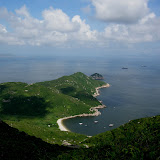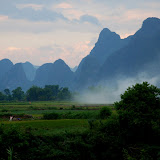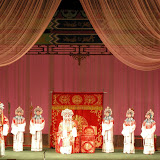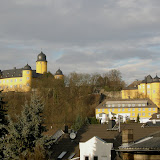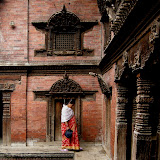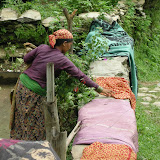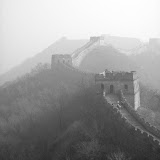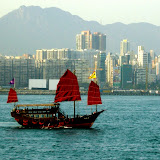从尼泊尔回来了, 带着对那雨季中的山山水水的梦幻般的记忆, 回到实实在在的生活, 发现两样都是好的,发现自己原来愿意是一个有线的风筝,一张有港湾的帆,旅行的兴奋和归家的快乐感觉都要。
七月是尼泊尔的雨季高峰。每天清晨必从雨声中醒来,然后等着云慢慢升起,雨也变 成了飘在风里的细丝,便可开始一天的活动了。大部分时间是雾蒙蒙的,看不到雪峰连绵的壮观景象。在山间小径前行,只有自己和旅伴,间或有一个衣着破旧却色彩鲜艳的农妇出现在雾中,感觉极其不真实,却又极其美丽。是的,即便在云雾笼罩的雨季,尼泊尔的色彩也令人难忘, 是妇人裙裾间的绛红,是阳光偶尔透过云缝射在山野中的翠绿。
成了飘在风里的细丝,便可开始一天的活动了。大部分时间是雾蒙蒙的,看不到雪峰连绵的壮观景象。在山间小径前行,只有自己和旅伴,间或有一个衣着破旧却色彩鲜艳的农妇出现在雾中,感觉极其不真实,却又极其美丽。是的,即便在云雾笼罩的雨季,尼泊尔的色彩也令人难忘, 是妇人裙裾间的绛红,是阳光偶尔透过云缝射在山野中的翠绿。
尼泊尔人有少见的平和、友善,许多时候安静得仿佛是自然的一部分,深藏着某种与生俱来的笃定。这是否与他们的信有关?这信绝不仅是去寺庙烧香朝拜,去摸一下街角的铃铛,或是往额中眉间点一点红。这信不在行动中,却好象在不思考、不忧虑和不行动中。一个坐在石阶上的老人,如一尊雕塑,脸上看不出什么表情,好象世界和时间都与他无关。可是他忽然在你身后说一句短短的话,你奇怪地觉得他刚刚告诉了你一个秘密,一个有关一切人事变迁和斗转星移的秘密。
雨季中的尼泊尔是世外桃源。我们说好了再来,或者在明年春天, 来看喜玛拉亚的晴天, 看雪峰间的日出日落,想象中那一定会是终生难忘的。
(尼泊尔的两组照片在“透过我的镜头”中)
Back from Nepal, back to daily life with a dreamlike memory of the waters and hills in the monsoon Himalaya. Like the open sea and a harbour to a sail, the excitement of a journey and the calmness of a home are both invaluable to me.
The end of July was the peak of Nepal's monsoon season. Every morning we woke up to hear the rain drops knocking at the windows. As the clouds rose slowly with the temperature, the heavy shower gradually subsided to a mist. The snow-capped Himalayan peaks would still hide in the clouds, for days and weeks. Despite the weather, day trips to the top of nearby hills were very pleasant. On the winding trekking trails, the complete quietness and greenness enshrouded us. Nothing was heard but the footsteps of my travel companion and me. Occasionally in a distance, a local woman would appear in a worn but very colourful Nepali dress. This looked extremely unreal yet extremely beautiful. The colours of Nepal are unforgettable, in a grey backdrop of the foggy monsoon season. It was the dark red skirt a woman walked around in, or the bright green the hills exhibited under a thread of sunshine momentarily breaking through the clouds .
The Nepalis displayed a friendliness and calmness rarely seen in other peoples. Their presence was so peaceful that you took them as a natural part of their surroundings. There seemed to be a deep steadfastness that they were born with. Can I read this as a demonstration of their faith? Such a faith does not stop at stupas, street-corner bells or the redness Nepalis put on their foreheads. It does not manifest itself in actions, but in non action. An old man sat on a stone like a sculpture, motionless and expressionless, as if he was an outsider to the world and the time. However, when he murmured something as you walked past him, you had the strange feeling that he had just revealed a secret, a secret that carried an Answer to The Question.
Nepal in the monsoon is Shangri-la. We will come back to it, perhaps next spring, to see the fine days in Himalaya and to watch the sun rise over the snow peaks. That scene, I imagine, will stay with me as long as I live.
(Two sets of pictures from Nepal are in the section “Through My Lens”)
 Enticed by the participation of Meryl Streep and Robert Redford in it, we went to see Lions for Lambs and were disappointed.
Enticed by the participation of Meryl Streep and Robert Redford in it, we went to see Lions for Lambs and were disappointed. 


